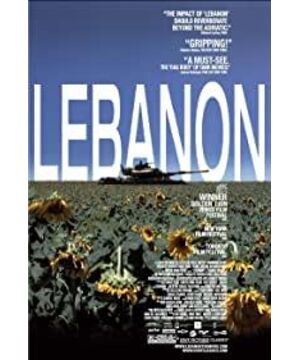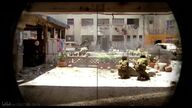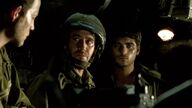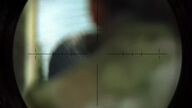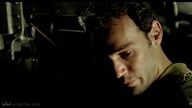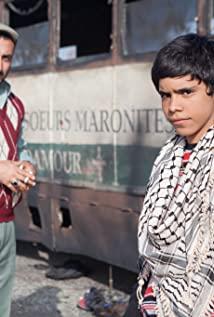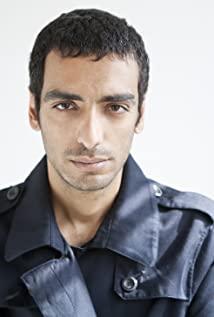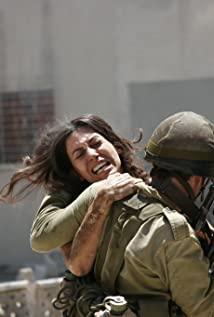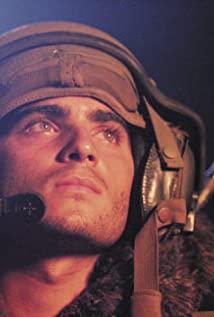At the 66th Venice Film Festival, Israeli director Samuel Maoz won the Golden Lion Award for Best Picture at the Venice Film Festival for his first feature film Lebanon. Samuel Maotz is another newcomer who has risen in the international film circle in recent years. He was born in Tel Aviv, Israel, and developed a strong interest in movies from a young age. At the age of 18, he has made more than ten experimental short films. . When the fifth Middle East war broke out in 1982, Samuel Maoz was drafted into the army as a tank soldier and experienced a bloody war in Lebanon. After the war, Samuel Maoz returned home and completed his studies in film studies at a university in Israel. But the peaceful life after being discharged from the army could not heal the mental wounds he suffered during the war. All the moments on the battlefield were tormenting his heart. Samuel Maoz wanted to make a film about his wartime experience, so he started writing scripts. But painful memories repeatedly interrupted his writing. He once said that "every time I pick up the pen, I can smell the smell of burning human flesh", which made it impossible for him to continue writing. It was not until later that he decided to be strong. Up, "must bring that flavor out" and finally finished the film in 2009. The film is adapted from his war experience and has a strong autobiographical color. In an interview, Samuel Maoz even objected to others calling his film a "war film", claiming that "the film expresses me The personal story is my personal growth history." Indeed, in this film, we do not see the heroism and heroism that are common in war films, but only a war in which a panicked tank soldier peeks through the scope.
An oppressive atmosphere in a closed space
Samuel Maotz said of the film, "I want to give people another angle, to evoke an emotional experience". So he chose a very special point of view, that is, to express the war through the scope of the tank muzzle, "I hope the audience's understanding is synchronized with the characters in the film, and they imagine themselves as soldiers in the tank, not as a bystander. Let them also experience the feeling in a closed space.” His approach established the overall style of the film: the audience was forced to follow the director to feel the repressed emotional expression in a closed space from beginning to end. This sense of oppression may be Samuel Maoz's most profound experience of war. The depression and panic on the battlefield are unimaginable for ordinary people, and the director made every audience feel the fear and despair brought about by the war through careful scene scheduling.
The panic and depression brought about by the war first came from the feeling of suffocation created by the cramped space. This is where the film is different. In the well-known war films such as "Apocalypse Now" and "Saving Private Ryan", the plot unfolds in open scenes, creating a terrifying and depressing atmosphere through bloody battlefield killings. But this type of film also has its own flaws: the audience is more shocked by these war scenes, and it is difficult to feel the feelings of individuals in them. In "Lebanon", the director set all the stories in the tank, so that the audience can experience the experience of each soldier in a more nuanced way. The closed and greasy tank space is like a cage, trapping the soldiers participating in the war. The dirt and filth inside the tank seem to indicate that the war itself is also the same. The mirror formed by the sewage in the tank has also become a reflection of the soldiers' psychology. From the beginning The clarity of the chariots and the chaos that followed seemed to indicate that the soldiers gradually lost their nature in this suffocating space, merged with the chariot, and tragically reduced to part of the war machine.
In addition to the space factor, the tense interpersonal relationship is also an important reason for the depressing atmosphere inside the tank. In war-themed movies, the feelings between comrades-in-arms are usually the focus of the film. For example, "Assembly" tells the story of "every sacrifice is immortal." The deep feelings and the brotherhood of life and death have become the last trace of warmth on the icy battlefield. But in "Lebanon", the camaraderie seems to be deliberately weakened. When the four people in the tank met and introduced each other for the first time, the loader Hertzel showed disdain for others and refused to the alert task assigned by Commander Assi. implement. Assi's heated argument with Hertzel added a dash of tension to the small space. The four warriors who should be united are fighting each other, facing the unknown future in confusion. Not only that, everyone in this small group has problems that are difficult to solve. Commander Assi is indecisive and unable to perform his duties. He will only say "I have my own arrangements" over and over again, and can't deal with emergencies at all; Loader Hertzel has no collective concept and just wants to finish the task quickly and go home for vacation; the machine gunner Shmulik can't bear the pressure of war and can't pull the trigger; the pilot Yigal is young and timid and will cry and be overwhelmed when he is frustrated. The four soldiers in the film are all flawed, no wonder the Hollywood Reporter says "this is the greatest anti-heroic film ever made", the hero is completely absent in this film, and we don't see sacrificial sacrifice inside the tank , The heroic and unyielding warrior can only see four ordinary young people caught in the war. They don't have the so-called sense of responsibility, honor, and the pride of dying for the country. What they have is just the hesitation and helplessness of being involved in a war for no reason. The shirks, accusations and arguments between them have made the originally repressed space even more tense and uneasy. This repressive atmosphere seems to be a complaint about the harm of war itself to people's minds.
The oppressive atmosphere in the film not only comes from the cramped interior of the tank and tense interpersonal relationships, but the limited narrative perspective in the scope also leads to potential external dangers. The four people in the tank are surrounded by steel, and they live in a claustrophobic space. They can never see the outside world beyond what they can see in the scope. This narrow field of view keeps them in a constant state of panic. They cannot see everything around them from an omniscient perspective, and the limited perspective adds to the helplessness of the tank soldiers, who are always at a loss for their future. This repressed emotion eventually erupted after the tank was attacked. Hertzel and Yigal insisted on abandoning the tank and returning to the base, but the operation commander Jamil refused their request and insisted that the damaged tank continue to move forward. So the four returned to peace and continued to perform their tasks in the dirty tank. But the threat from the outside world did not disappear. The four of them drove tanks and followed the Falangists, who were indistinguishable from friends and foes, into the Syrians' control area, putting themselves in great danger, but it was they who were trying to escape. The tanks were a big help, and they were out of the woods after a blind and frenzied bombardment, unfortunately Yigal was shot and died. The film’s depressing atmosphere runs through the entire film. Even at the beginning and the end of the two scenes of the sunflower field, which are like oil paintings, there is still a sense of unease hidden in the silence. The psychology of an audience, from this point of view, the director's choice of closed space and limited vision is a success, but it may be that the director expresses his personal feelings too much, so the value judgment of the whole film on the war also shows a personalization. color. The Paradoxical
Expressions of World War II Ethics
Cimino once said that "a good war movie must be anti-war", and the same is true of "Lebanon". However, this film is different from general anti-war films. This film is not from a macro perspective, explaining the destructiveness of war and visualizing it, in order to stimulate the audience's vision and arouse the audience to hate war. Instead, it tries to express the personal feelings of the war, through the psychological transformation of soldiers on the battlefield to illustrate that "war is a kind of devil-like thing, it can awaken the devil in your heart". The film expresses the extremely contradictory war ethics and tells the inner struggle of the perpetrators in the war.
Not every soldier is born bloodthirsty. When they kill for the first time in war, they often go through an extremely painful process. The director vividly shows the difficult mental choices that ordinary soldiers experience on the battlefield. When machine gunner Shmulik encountered the enemy for the first time, he saw through the scope a young man as terrified as himself, so he never pulled the trigger. At that moment, what he saw was just an ordinary person, not the target of training. The good side of human nature made him unable to kill a stranger's life. But it was his single thought that caused his comrade-in-arms to be shot and killed by the opponent. Shmulik experienced the death of his comrades through the scope, and this was undoubtedly the first time the poison of war had eroded his soul. He had to accept a crude war ethics: this is war, either you die or I die. Therefore, when encountering the Lebanese again, Shmulik pulled the trigger while struggling, but unexpectedly hit an old chicken farmer. The bloody old man shouted "peace" on the ground, and the operation commander shot him blankly Killing, killing in the name of self-defense seems justifiable. Neil J. Smelser pointed out in his study of the determinants of destructive behavior, "The chronic disease of evil is that the evil man always believes that others will do evil to him." Although Shmulik and others are not all evil people, But in the war, the killings caused by fear and survival have begun to emerge, and the "devil in the heart" that the director said has been awakened. But the soldiers represented by Shmulik were extremely painful for this kind of killing. When he carried the body of his dead comrade out, he wiped the blood from his hands in horror. The death of his comrade made him feel guilty. To the extent he appears to be a double killer, his hesitancy results in the sacrifice of his comrades, his decisions lead to the death of civilians, and no matter what choices he makes in the tank, the end result will be the death of others. In such a ridiculous situation, these soldiers will inevitably forget their conscience and choose to kill. The war gradually distorted the minds of soldiers and turned them into killing machines.
Once soldiers accept the so-called ethics of war, the destruction they cause is extremely terrifying. Another Israeli director, Ali Forman, "Waltzing with Basher" tells the story of the "Beth" in this war. The story of the Lu Massacre” revealed the disgraceful scene of the Israeli army in this war. Samuel Maoz also admitted in an interview that "I can't escape my responsibility", so he directly showed Israel's atrocities in the war in the movie. In the movie, Commander Jamil emphasized many times when arranging the mission, "Our bombers have swept that level." In this seemingly plain statement, there is an unspeakable sin, and the director uses the sight to close-up way to reproduce these bloody scenes one by one. The tragic scene with the background interference stripped in the scope is shocking. When Shmulik and four of them drove the tank into the city, the entire city had been reduced to a purgatory on earth, with broken walls and corpses everywhere. And a donkey that was bombed to the ground and survived was particularly miserable and terrifying. In the close-up, it was breathing in pain and rapidity, and tears were streaming from the corners of its eyes. This tragedy also seems to have verified a passage of Churchill's words: Modern warfare has accumulated a huge dynamic, making people slaughtered by machines, and killing has become an industry, no different from the slaughter of cattle in Chicago. War becomes a naked plunder of life.
Shmulik and others also seem to feel guilty for their atrocities, and they have to face the hatred of local survivors. The director reinforces this effect with three consecutive close-ups in the film, the first of an old man sitting next to a dead body, the second of a panicked child, and the third of a mother who has lost all her loved ones, They are different in age and gender, but the panic, anger and helplessness in their eyes are the same. Their gaze on the camera seems to be a torture to the soul of every soldier participating in the war, and these hateful eyes have also become an emotional refinement of the situation in the Middle East. Of course, these helpless citizens may not know that the soldiers inside the steel shell are also terrified. As the director said, it seems that they just "wanted to survive and escape from this environment, so they hid in the tank and fired desperately". This narrative tendency is exceptionally evident in the second half of the film. Shmulik's four-man tank strayed into Syrian-held territory, and their identity seemed to shift from intruder to breakout, to the underdog in this war, and that identity transitioned to their rampant fire (including the use of internationally banned white phosphorus bombs) ) provides a good reason: we are self-defense, the instinct to survive. So the film forms a paradoxical situation here: whether it is the Lebanese citizens or the invading Israeli soldiers, it seems that they are all victims of the war. Where is Samuel Maotz's foothold in shooting this film to redeem his soul?
Three awkward connections between art and reality
Although Samuel Maoz repeatedly stated that he "doesn't have a strong political orientation" and that what the film records is only "historical material", as Said said in "Culture and Imperialism", "I don't think authors are mechanically determined by ideology, class, or economic history, but I do believe that authors must be in their social history, shaping their history and social experience to varying degrees, and by this history and social experience.” This means that it would be biased to interpret the film without social reality. To objectively evaluate this film, we must examine the social background of the film. The film tells what happened in the fifth Middle East war. On June 6, 1982, Israel dispatched more than 100,000 people from the army, navy and air force to launch a large-scale attack on Lebanon under the pretext that its ambassador to the UK was killed. In a few days, half of Lebanon was occupied. This act of attacking the capital of an enemy country to defend one's own territory has a very aggressive color. However, the film does not explain the historical background at the beginning, but only tells a military operation, showing what seems to be the moral dilemma that can arise in any war. Of course, it may also be that the director feels that it is a well-known historical fact that needs no explanation. But imagine that a person who is completely ignorant of this history to watch this movie may get a diametrically opposite movie viewing experience. He may only be a metaphysical evaluation of war, only criticize the evil of war itself, and ignore it. the guilt of the initiators of the war. This is also the film's awkward connection between art and reality, Samuel Maoz seems to place too much emphasis on personal war experience, like his choice of scope in this film, the too narrow perspective prevents him from Observing the full picture of the war can only be limited to an individualized understanding of the war. And this war experience seems to be, as the British historian Joanna Burke put it in "Face to Face Killing", that soldiers "obey orders" and "circumstances" to exonerate their crimes on the battlefield . Samuel Maoz himself may not mean this, but when he downplayed the aggressiveness of the war and only emphasized the damage to human nature, it has restricted the depth of reflection in the film, and the relationship between artistic expression and historical reality will never be the same. The relationship of reciprocity, "Lebanon" can only be a personal war in the scope.
View more about Lebanon reviews


